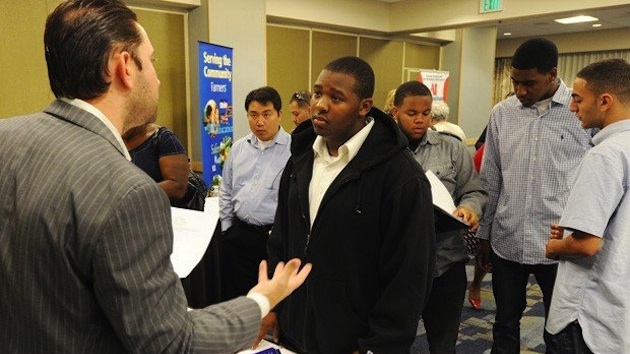

An unemployed American speaks to a recruiter at a jobs fair. (Photo: Mark Ralston AFP/Getty)
The U.S. economy added far fewer jobs than the 200,000 economists had forecast in the month of April, according to the ADP National Employment Report.
“April job gains came in under 200,000 for the second straight month,” said Carlos Rodriguez, president and chief executive officer of ADP. “Companies with 500 or more employees had the slowest growth.”
Payrolls for businesses with 49 or fewer employees increased by 94,000 jobs in April, down from 105,000 the month prior. Employment among companies with 50-499 employees actually increased by 70,000 jobs, up from the 64,000 in March. Employment gains at large companies — or, those with 500 or more employees — fell slightly from March, adding just 5,000 jobs in April, down from 6,000.
“Fallout from the collapse of oil prices and the surging value of the dollar are weighing on job creation,” Mark Zandi, chief economist of Moody’s Analytics said. “Employment in the energy sector and manufacturing is declining. However, this should prove temporary and job growth will reaccelerate this summer.”
However, despite Mr. Zandi’s optimism, the government overestimated in their initial 1Q gross domestic product (GDP) report. In reality, according to a Commerce Department report released Tuesday, the U.S. trade deficit ballooned, indicating the economy did not even grow by the abysmal 0.2 percent initially reported. Instead, the new data suggest the economy contracted in the 1Q and more recent economic data has not pointed to a rebound.
The ADP report found troubling news for wage growth, as the sectors of the economy that provide higher-paying jobs continue to show lackluster performance. Manufacturing shed 10,000 jobs in April after losing 3,000 the month prior, while goods-producing employment declined by 1,000 jobs in April, down from 3,000 jobs gained in March.
The most damning journalistic sin committed by the media during the era of Russia collusion…
The first ecological study finds mask mandates were not effective at slowing the spread of…
On "What Are the Odds?" Monday, Robert Barnes and Rich Baris note how big tech…
On "What Are the Odds?" Monday, Robert Barnes and Rich Baris discuss why America First…
Personal income fell $1,516.6 billion (7.1%) in February, roughly the consensus forecast, while consumer spending…
Research finds those previously infected by or vaccinated against SARS-CoV-2 are not at risk of…
This website uses cookies.